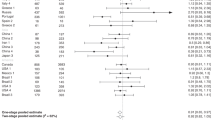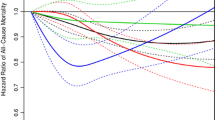The effect of drinking Chinese green tea on the risk of stomach cancer was evaluated in a population-based case-control study conducted in Shanghai, China, from October 1991 to December 1993. Eligible cases were incident cases of primary stomach cancer diagnosed during the study period among residents of Hongkou district and Nanhui county aged under 80 years. Controls were selected from the same street or commune where the case resided and were matched to the cases on age (within three years) and gender. A total of 711 cases and 711 matched controls, more than 90 percent of the eligible subjects, completed the interview. Information was obtained on the types of tea used, age when habitual tea drinking started, frequency of new batches of tea leaves used per day, number of cups brewed from each batch, total duration of drinking for each batch, strength and temperature of the tea consumed. Statistical analysis was based on modelling through conditional logistic regression. After adjusting for age, gender, place of residence, education, birthplace, alcohol consumption, and cigarette smoking, the odds ratio (OR) comparing drinkers of green tea with nondrinkers was 0.71 (95 percent confidence interval = 0.54–0.93). The adjusted OR decreased with increasing number of new batches of the green tea consumed each day (P value trend = 0.006). With the largest series of stomach cancer cases to date, this study found green-tea consumption associated with lower risk of stomach cancer. Among drinkers of green tea, the risk of stomach cancer did not depend on the age when habitual green-tea drinking started. Green tea may disrupt gastric carcinogenesis at both the intermediate and the late stages.
Similar content being viewed by others
References
Gao YT, McLaughlin JK, Blot BJ, Ji BT, Dai Q, Fraumeni JFJr. Reduced risk of esophageal cancer associated with green tea consumption. JNCI 1994; 86: 855–8.
Yang CS, Wang ZY. Tea and cancer. JNCI 1993; 85: 1038–49.
Higginson J. Etiological factors in gastrointestinal cancer in man. JNCI 1966; 37: 527–45.
Graham S, Lilienfeld AM, Tidings JE. Dietary and purgation factors in the epidemiology of gastric cancer. Cancer 1967; 20: 2224–34.
Trichopoulos D, Ouranos G, Day NE, et al. Diet and cancer of the stomach: a case-control study in Greece. Int J Cancer 1985; 36: 291–7.
Tajima K, Tominaga S. Dietary habits and gastrointestinal cancers: A comparative case-control study of stomach and large intestinal cancers in Nagoya, Japan. Jpn J Cancer Res 1985; 76: 705–16.
Risch HA, Jain M, Choi NW, et al. Dietary factors and the incidence of cancer of the stomach. Am J Epidemiol 1985; 122: 947–59.
Heilbrun LK, Nomura A, Stemmermann GN. Black tea consumption and cancer risk: a prospective study. Br J Cancer 1986; 54: 677–83.
Demirer T, Icli F, Uzunalimoglu O, Kucuk O. Diet and stomach cancer incidence: a case-control study in Turkey. Cancer 1990; 65: 2344–8.
La Vecchia C, Negri E, Franceschi S, D'Avanzo B, Boyle P. Tea consumption and cancer risk. Nutr Cancer 1992; 17: 27–31.
Agudo A, Gonzalez CA, Marcos G, et al. Consumption of alcohol, coffee, and tobacco, and gastric cancer in Spain. Cancer Causes Control 1992; 3: 137–43.
Kinlen LJ, Willows AN, Goldblatt P, Yudkin J. Tea consumption and cancer. Br J Cancer 1988; 58: 397–401.
Hansson LE, Nyrén O, Bergström R, et al. Diet and risk of gastric cancer. A population-based case-control study in Sweden. Int J Cancer 1993; 55: 181–9.
Kono S, Ikeda M, Tokudome S, Kuratsone M. A case-control study of gastric cancer and diet in northern Kyushu, Japan. Jpn J Cancer Res 1988; 79: 1064–74.
Yu GP, Hsieh C-c. Risk factors for stomach cancer: a population-based case-control study in Shanghai. Cancer Causes Control 1991; 2: 169–74.
Oguni I, Cheng SJ, Lin PZ, Hara Y. Protection against cancer risk by Japanese green tea. Prev Med 1992; 21: 332.
Breslow NE, Day NE. Statistical Methods in Cancer Research, Vol 1. The Analysis of Case-control Studies, Lyon, France: International Agency for Research on Cancer, 1980; IARC Sci. Pub. No. 32. 248–79.
Parkin DM, Muir C, Whelan SL, Gao YT, Ferlay J, Powell J. Cancer Incidence in Five Continents, Vol. 6. Lyon, France: International Agency for Research on Cancer, 1992; IARC Sci. Pub. No. 120.
Correa P. Human gastric carcinogenesis: a multistep and multifactorial process — First American Cancer Society Award Lecture on Cancer Epidemiology and Prevention. Cancer Res 1992; 52: 6735–40.
International Agency for Research on Cancer. Coffee, Tea, Mate, Methylxanthines, and Methylgloxyal. Lyon, France: International Agency for Research on Cancer, 1991; IARC Monogr Eval Carcinog Risk Hum, 51: 207–71.
La Vecchia C, Negri E, D'Avanzo B, Franceschi S. Food temperature and gastric cancer. Int J Cancer 1990; 46: 432–4.
Hu J, Nyrén O, Wolk A, et al. Risk factors for oesophageal cancer in northeast China. Int J Cancer 1994; 57: 38–46.
Wang HH, Antonioli DA, Goldman H. Comparative features of esophageal and gastric adenocarcinomas: recent changes in type and frequency. Hum Pathol 1986; 17: 482–7.
International Agency for Research on Cancer. Schistosomes, Liver Flukes and Helicobacter pylori. Lyon, France: International Agency for Research on Cancer, 1994; IARC Monogr Eval Carcinog Risk Hum, 61: 177–240.
Author information
Authors and Affiliations
Additional information
This work was supported by US Public Health Service grant CA52560 from the National Cancer Institute, National Institutes of Health, Department of Health and Human Services.
Rights and permissions
About this article
Cite this article
Yu, Gp., Hsieh, Cc., Wang, Ly. et al. Green-tea consumption and risk of stomach cancer: a population-based case-control study in Shanghai, China. Cancer Causes Control 6, 532–538 (1995). https://doi.org/10.1007/BF00054162
Received:
Accepted:
Issue Date:
DOI: https://doi.org/10.1007/BF00054162




